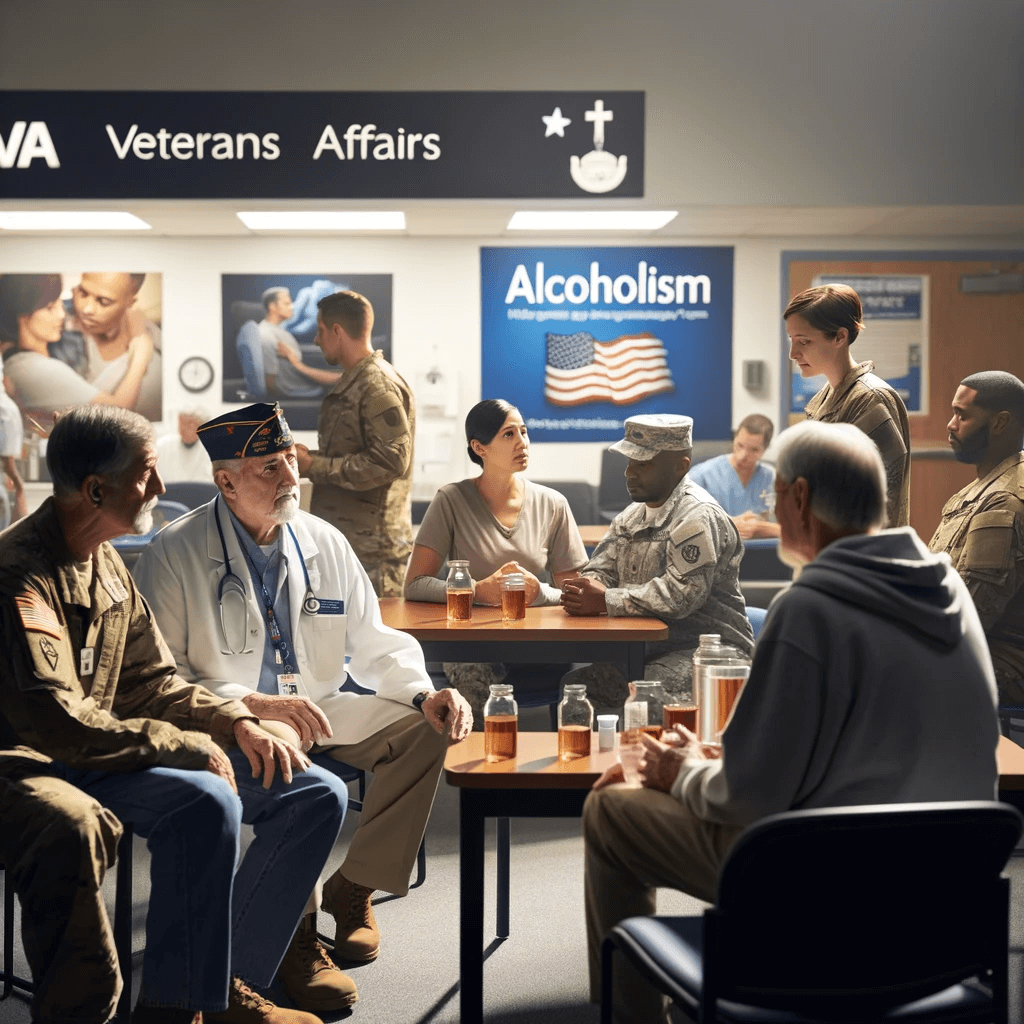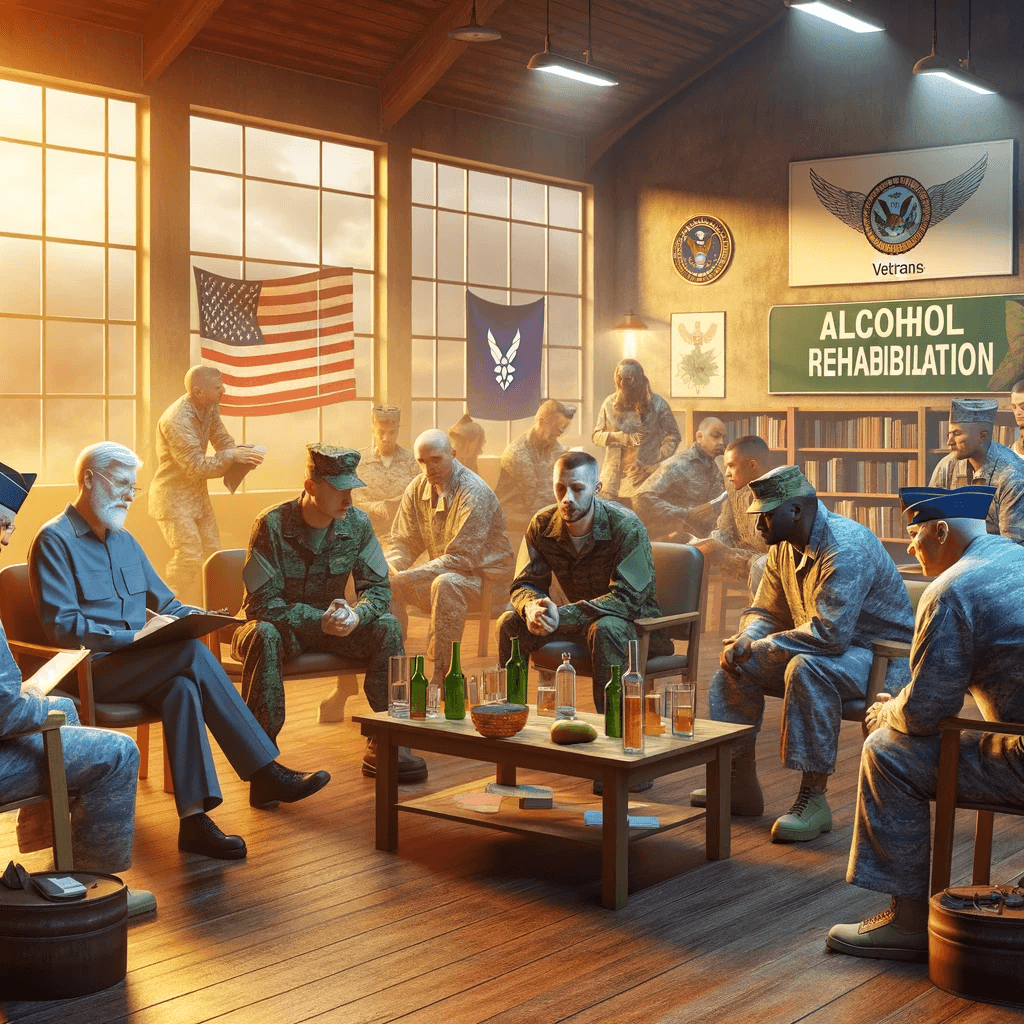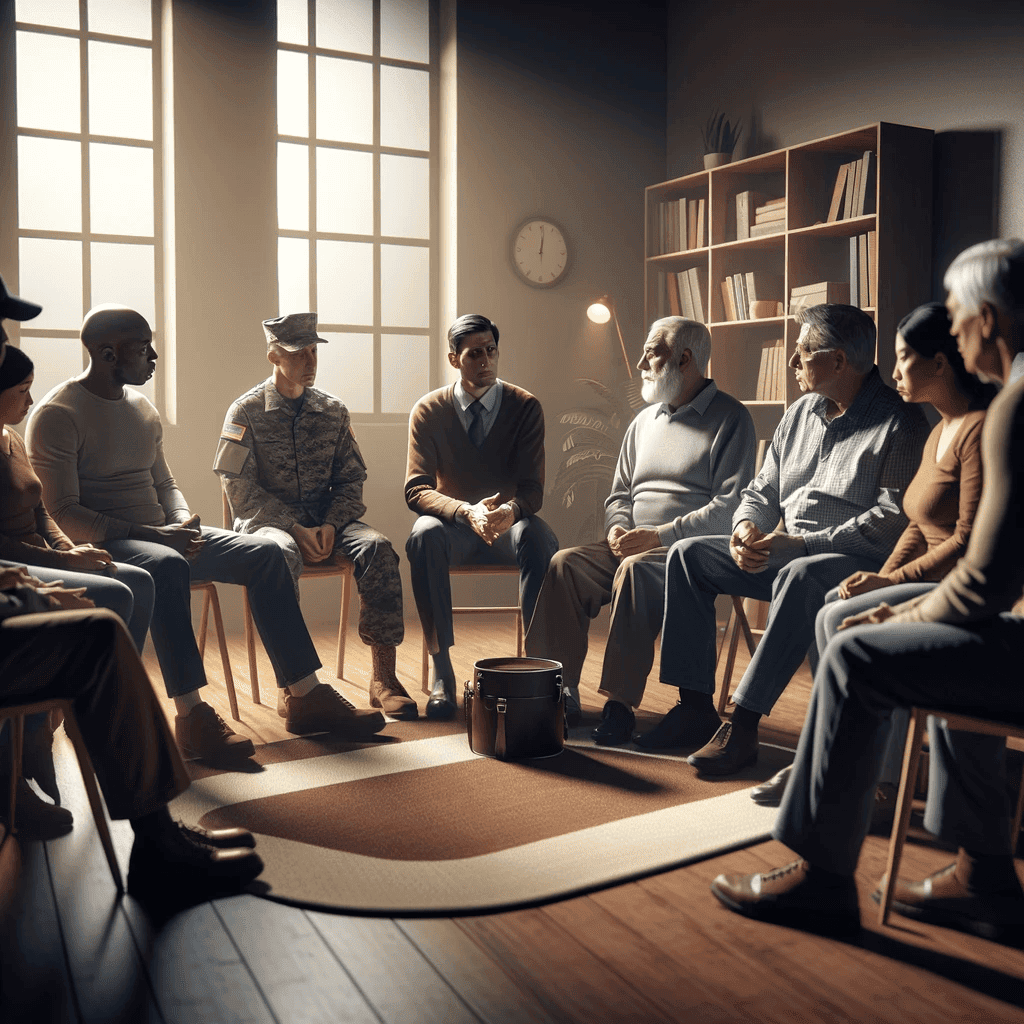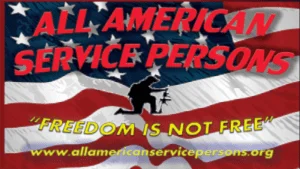
The battlefield may be far behind, but for many veterans, the scars of their service run deep. While the visible wounds may heal, the invisible ones, like those inflicted by alcohol abuse, can fester and silently wreak havoc on their lives.
We will delve into the hidden epidemic of alcoholism among veterans, exploring its causes, consequences, and the glimmer of hope that shines through treatment and support.
Roughly 23% of male veterans report binge drinking, a rate significantly higher than the general population. This statistic is not a mere number; it represents countless individuals struggling with a complex disorder, often intertwined with the invisible wounds of post-traumatic stress disorder (PTSD).
The reasons why veterans turn to alcohol are as diverse as the individuals themselves, but the impact is undeniable. Alcohol can exacerbate PTSD symptoms, leading to increased anxiety, nightmares, and flashbacks. It can damage physical and mental health, contributing to liver disease, depression, and even suicide.
The consequences ripple outward, affecting families, communities, and the veteran’s ability to reintegrate into civilian life.
But in this darkness, there is light. Effective treatment options exist, specifically tailored to the unique needs of veterans. Specialized alcohol rehab programs that address the co-occurring challenges of PTSD and addiction offer a path to recovery.
Veterans Affairs hospitals and community resources stand ready to provide support and guidance. And perhaps most importantly, a growing network of fellow veterans, their families, and communities are reaching out with understanding and compassion.
This article is more than just an exploration of a problem; it’s a call to action. It’s a call to understand the silent struggle of veterans battling alcohol abuse, to recognize the signs, and to offer support.
It’s a call to break the cycle of addiction and build a future where every veteran has the opportunity to heal and reclaim their lives.
Join us as we journey through this complex issue, shedding light on the hidden scars and illuminating the path toward hope and recovery.
Recognizing the Silent Scars: Unveiling the Signs of Alcoholism in Veterans

The wounds of war are often visible, etched on the bodies and faces of veterans who have bravely served their country. But beneath the surface, another battle rages – the silent struggle with alcohol abuse. Recognizing the signs of this hidden enemy is crucial for offering timely support and guiding veterans toward recovery.
While the outward manifestations may be subtle, there are patterns and changes in behavior that can serve as red flags. Be mindful of these potential indicators:
Changes in drinking habits:
Increased alcohol consumption, especially during earlier hours of the day, more frequent drinking, or engaging in risky drinking situations like driving under the influence.
Physical changes:
Noticeable fatigue, tremors, unexplained weight loss or gain, and hangovers that seem to linger longer. Deterioration in personal hygiene and grooming habits can also be a sign of alcohol dependence.
Changes in mood and behavior:
Irritability, anger outbursts, withdrawal from social activities, and depression can all be linked to alcohol abuse. Veterans struggling with addiction may also become isolated or secretive about their drinking.
Neglect of responsibilities:
Skipping work, missing appointments, and neglecting family obligations can be consequences of prioritizing alcohol over other aspects of life.
But the picture extends beyond just physical symptoms. For veterans, the trauma of combat and the challenges of reintegration into civilian life can fuel a vicious cycle of alcohol abuse.
- PTSD and Alcohol: Alcohol can exacerbate PTSD symptoms, triggering flashbacks, nightmares, and anxiety. This can lead veterans to drink more as a coping mechanism, further worsening their PTSD.
- Social isolation: Veterans struggling with alcohol abuse may withdraw from social circles, exacerbating feelings of loneliness and isolation, perpetuating the cycle of addiction.
- Financial difficulties: Job loss, missed bills, and pawning belongings can be signs of the financial strain caused by alcohol dependence.
Understanding these interconnected factors is key to providing effective support. If you notice these signs in a veteran you know, remember:
- Approach with compassion and understanding: Stigma and judgment are barriers to seeking help. Be a safe space for open communication and avoid harsh criticism.
- Offer resources and support: Connect them with VA programs, specialized veterans’ alcohol rehab centers, or support groups like the “Salute to Recovery” program.
- Encourage professional help: Don’t hesitate to encourage seeking professional diagnosis and treatment. VA hospitals and community resources offer comprehensive support.
By recognizing the signs and offering support, we can help veterans break free from the shadows of alcohol abuse and reclaim their lives. In the next section, we’ll delve deeper into the resources and treatment options available to guide veterans on their journey toward recovery.
Navigating the Path to Recovery: Resources and Support for Veterans

Breaking free from the grip of alcohol abuse is a challenging journey, but for veterans, it can be particularly daunting. The unique experiences of military service, the invisible wounds of PTSD, and the challenges of reintegration into civilian life can complicate the path to recovery.
However, hope exists, and a multitude of resources and support systems stand ready to guide veterans toward healing and a brighter future.




The Department of Veterans Affairs (VA) stands as a cornerstone of support for veterans struggling with alcohol abuse. VA hospitals and outpatient clinics offer comprehensive treatment programs, including:
- Individual and group therapy: Tailored to address the specific needs and challenges faced by veterans with alcohol use disorder.
- Medication management: Prescribing medications to manage withdrawal symptoms, cravings, and co-occurring mental health conditions.
- Cognitive behavioral therapy (CBT): Helping veterans develop healthy coping mechanisms and identify triggers for alcohol use.
- Family support: Providing resources and guidance to families impacted by veteran alcohol abuse.
Specialized veterans’ alcohol rehab centers offer a safe and supportive environment for recovery, often incorporating elements of military culture and camaraderie. These programs typically provide:
- Holistic treatment: Addressing the physical, psychological, and social aspects of alcohol abuse.
- Trauma-informed care: Recognizing the potential impact of PTSD and other combat-related experiences on addiction.
- Peer support groups: Connecting veterans with others who understand their struggles and can offer encouragement and guidance.
- Vocational training and education: Helping veterans develop skills and resources for successful reintegration into the workforce.
Community-based resources like the Salute to Recovery program and veterans’ support groups offer additional avenues for support and connection. These programs often provide:
- Social support and camaraderie: Creating a safe space for veterans to share their experiences and receive non-judgmental support.
- Educational workshops and resources: Providing information about alcohol abuse, treatment options, and available resources.
- Advocacy and outreach: Connecting veterans with healthcare providers, social services, and other forms of assistance.
Remember: Seeking help is a sign of strength, not weakness. Encourage veterans struggling with alcohol abuse to reach out for the support they deserve. Here are some resources to get them started:
- VA Alcohol Treatment Hotline: 1-800-662-HELP (4357)
- National Suicide Prevention Lifeline: 988
- SAMHSA National Helpline: 1-800-662-HELP (4357)
- Salute to Recovery: https://americanaddictioncenters.org/veterans/salute-to-recovery-program
- Vet Center Program: https://www.vetcenter.va.gov/
- PTSD National Hotline: 1-800-980-9800
- The Wounded Warrior Project: https://www.support.woundedwarriorproject.org/
By raising awareness, providing resources, and offering unwavering support, we can help veterans break free from the cycle of alcohol abuse and reclaim the lives they deserve.
We’ll explore the broader impact of veteran alcoholism and the importance of community engagement in creating a future where every veteran has the opportunity to heal and thrive.
Beyond the Battlefield: The Ripple Effect of Veteran Alcoholism and the Power of Community

The impact of veteran alcoholism extends far beyond the individual struggling with addiction. It ripples outward, affecting families, communities, and the very fabric of society. The economic costs are staggering, with healthcare expenses and lost productivity soaring into the billions.
The social costs are even more profound, with broken relationships, child welfare concerns, and increased crime rates all bearing the scars of veteran alcohol abuse.
The Cost on Families:
Children of veterans with alcohol problems are at increased risk for mental health issues, academic difficulties, and substance abuse themselves. Spouses and partners often shoulder the emotional and practical burdens of addiction, facing financial strain, emotional neglect, and even physical abuse.
The impact on family dynamics can be devastating, leaving lasting wounds that touch generations.
The Cost on Communities:
Veterans returning from combat often struggle to reintegrate into civilian life. Alcohol abuse can exacerbate these challenges, leading to social isolation, unemployment, and homelessness. This can create a burden on communities, straining social services and impacting public safety.
The Cost on Society:
The stigma surrounding mental health and addiction can further isolate veterans and prevent them from seeking help. This not only perpetuates the cycle of addiction but also weakens the fabric of our society, hindering our ability to support those who have served their country.
But amidst the darkness, there is hope. By recognizing the far-reaching impact of veteran alcoholism, we can foster a sense of collective responsibility and build a more supportive community. Here are some ways we can make a difference:
- Destigmatize mental health and addiction: Open conversations and public education can break down barriers and encourage veterans to seek help without shame.
- Support family members: Provide resources and support groups for families impacted by veteran alcohol abuse. Empowering families can create a stronger support system for veterans.
- Advocate for funding: Invest in programs specifically designed to address veteran alcohol abuse and co-occurring mental health conditions.
- Create opportunities for community engagement: Volunteer opportunities, social events, and mentorship programs can help veterans reconnect with their communities and find purpose beyond addiction.
- Support veteran-owned businesses: Patronizing businesses owned by veterans can not only stimulate the economy but also foster a sense of camaraderie and support.
By taking these steps, we can create a community where veterans are not defined by their struggles but by their strength, resilience, and the unwavering support of their fellow citizens.
We can build a future where every veteran has the opportunity to heal, find purpose, and reclaim their rightful place in society.
Remember, the path to recovery is not solely the responsibility of the individual; it’s a shared responsibility that demands our collective commitment and compassionate action.
Let us stand together to support our veterans, not just on the battlefield, but in the lifelong struggle against the invisible wounds of war.
A Call to Action and a Glimmer of Hope

The struggle against veteran alcoholism is not a solitary battle. It is a collective responsibility, a call to action that demands engagement and compassion from every corner of society.
By raising awareness, shattering stigmas, and providing accessible resources, we can illuminate the path to recovery and empower veterans to reclaim their lives.
Remember, hope exists. The statistics may be bleak, but they do not paint the whole picture. Countless veterans have successfully overcome the challenges of alcohol abuse and are living fulfilling lives.
These stories of resilience and triumph offer a beacon of light, guiding others toward the support and resources they need to break free from the cycle of addiction.
Here are some final steps we can take to make a difference:
- Share this article: Spread awareness by sharing this information with your friends, family, and community. Every voice amplified is a step towards creating a more understanding and supportive environment. Volunteer your time:
Donate your time to veteran support organizations, community centers, or VA hospitals. Your presence and compassion can make a world of difference in someone’s life. - Advocate for policy change:
Support legislation that allocates funding for veteran treatment programs, expands access to mental health services, and reduces the stigma surrounding addiction. - Be a listening ear:
Be present for veterans who are struggling. Offer a listening ear without judgment, and encourage them to seek help. You could be the lifeline they need to reach out for support.
The road to recovery for veterans with alcoholism is long and arduous, but it is not insurmountable. By joining hands, raising our voices, and offering unwavering support, we can create a future where every veteran has the opportunity to heal, thrive, and reclaim the life they deserve.
Let us stand together, not just to honor their service, but to ensure that their sacrifices are not overshadowed by the silent wounds of war.
Only then can we truly fulfill our promise to those who have served: to leave no veteran behind.
Additional Resources and Tools
While the previous sections aimed to provide a comprehensive overview of veteran alcoholism, it’s important to offer specific resources and tools to guide you in your efforts to support veterans struggling with addiction.
This section will serve as a practical roadmap, equipped with links and information to help you navigate the landscape of available assistance.
National Hotlines and Websites:
- VA Alcohol Treatment Hotline: 1-800-662-HELP (4357)
- National Suicide Prevention Lifeline: 988
- SAMHSA National Helpline: 1-800-662-HELP (4357)
- Salute to Recovery: https://americanaddictioncenters.org/veterans/salute-to-recovery-program
- Vet Center Program: https://www.vetcenter.va.gov/
- PTSD National Hotline: 1-800-980-9800
- The Wounded Warrior Project: https://www.support.woundedwarriorproject.org/
Veteran-Specific Treatment Programs:
- VA Alcohol Treatment Programs: https://www.va.gov/health-care/health-needs-conditions/substance-use-problems/
- Veterans Reintegration Courts: https://www.justice.gov/ovw/special-tribal-criminal-jurisdiction-reimbursement-program
- Residential Treatment Programs: Many private and public facilities offer specialized programs for veterans with addiction. Utilize resources like the National Alliance on Mental Illness (NAMI) directory for assistance: https://www.nami.org/Home
Community Resources and Support Groups:
- Veteran Service Organizations (VSOs): These organizations, like the American Legion and VFW, often provide support groups and resources for veterans struggling with addiction.
- Local Mental Health and Addiction Agencies: Many communities have agencies offering counseling, support groups, and other services for individuals and families affected by addiction.
- Veteran Peer Support Groups: Connecting with other veterans facing similar challenges can be incredibly valuable. Seek out groups in your area or utilize online resources like the National Council for Behavioral Health’s Veteran Peer Support Network: https://www.thenationalcouncil.org/
Frequently Asked Questions
Q: What impact does alcoholism have on veterans?
A: Alcoholism can have a significant impact on veterans, potentially exacerbating existing mental health issues such as post-traumatic stress disorder (PTSD) and leading to strained relationships, financial hardship, and physical health problems.
Q: How prevalent is alcohol abuse among veterans?
A: Alcohol abuse is a concerning issue among veterans, with studies indicating higher rates of alcohol use and misuse among this population compared to the general public.
Q: What are the treatment options for alcoholism in veterans?
A: Veterans struggling with alcoholism have access to a range of treatment options, including specialized alcohol rehab programs tailored to address the unique needs and experiences of military personnel and veterans.
Q: Are there specific programs for veterans with co-occurring substance use and mental health disorders?
A: Yes, there are programs designed to address co-occurring substance use and mental health disorders in veterans, providing integrated treatment to effectively address both issues.
Q: Is alcoholism more prevalent among veterans who have served in combat?
A: Research suggests that alcohol misuse may be more prevalent among veterans who have experienced combat, as they may turn to alcohol as a coping mechanism for the psychological and emotional challenges they face.
Q: How can veterans get help for alcoholism?
A: Veterans can seek help for alcoholism through various avenues, including VA healthcare facilities, community-based organizations, and specialized treatment centers that cater to the needs of military veterans.
Q: What role does PTSD play in the development of alcohol use disorder among veterans?
A: PTSD can contribute to the development of alcohol use disorder among veterans, as individuals may turn to alcohol as a way to self-medicate and alleviate the symptoms of their PTSD.
Q: Are there specific support services for female veterans struggling with alcoholism?
A: Yes, there are support services specifically tailored to address the unique challenges faced by female veterans struggling with alcoholism and other substance use issues.
Q: How does alcoholism impact veterans returning from deployment?
A: Alcoholism can impact veterans returning from deployment by complicating their reintegration into civilian life, increasing the risk of relationship breakdowns, and interfering with their ability to address post-deployment challenges effectively.
Q: What should family members and loved ones of veterans with alcoholism know?
A: Family members and loved ones of veterans with alcoholism should understand the complex interplay between alcoholism and military service, support their loved ones in seeking treatment, and access resources to address their own needs and concerns.
Educational Resources and Tools:
- The National Institute on Alcohol Abuse and Alcoholism (NIAAA): This government agency offers comprehensive information about alcohol use disorder, including resources specifically for veterans: https://www.niaaa.nih.gov/
- The National Center for PTSD: This center provides information and resources about PTSD and its co-occurrence with substance abuse: https://www.ptsd.va.gov/
- The American Psychological Association (APA): The APA offers resources and information on various mental health topics, including alcohol use disorder: https://www.apa.org/
Remember, you are not alone in supporting veterans struggling with alcoholism.
By utilizing the resources available, actively engaging in your community, and offering a compassionate presence, you can make a significant difference in their lives.
Together, we can create a future where every veteran has access to the support and care they deserve.

